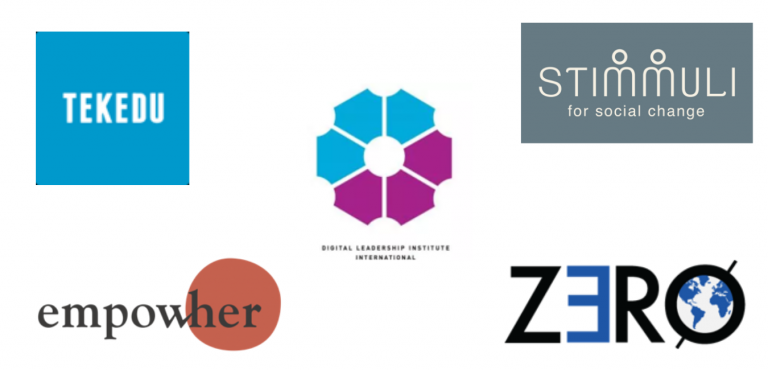We4Change latest
News and events
28 February 2023
Newsletter February 2023
We4Change project comes to an end:
THANK YOU to the We4Change partners and community!
28th of February 2023 markes the official closure of the project “We4Change: Girls and Women Connecting for Environmental Change” aimed at engaging, connecting and empowering young girls and women with digital and innovation skills, increase civic engagement and unlock their changemaking potential to engage in society and have an active role in addressing the challenges posed by climate change.
Over the past two years, partners Digital Leadership Institute (BE), Stimmuli for Social Change (GR), Empow’Her (FR), TEKEDU (MD) and ZERO (PT) have worked together to achieve this mission and had the following results:
- The We4Change Changemakers Event Curriculum: a series of educational materials to serve as examples of workshops that can be organized during a We4Change Changemakers Event to develop the skills promoted by the project: digital, social innovation, entrepreneurship, leadership and environmental awareness skills. It includes the specific methodology to prepare each workshop, but also other elements that can be used when organizing a Changemakers Event, such as working with mentors and coaches, and information on the practicalities of organizing the events. The curriculum can be downloaded for free in five languages: English, French, Greek, Portuguese and Romanian.
- The Handbook for Trainers and Youth Workers on Running a Successful We4Change Changemakers Event: complementing the curriculum, this handbook aims to support trainers and youth workers – including those that may have never applied before gender mainstreaming tools – to organize effectively a We4Change Changemakers Event, to drive active citizenship and empower girls and young women with digital and environmental awareness skills to become the future changemakers of their community. It introduces the guiding principles of the We4Change concept, values and philosophy, describes the competences that trainers and youth workers, as well as participants will apply for the different activities, and includes all practical information needed to organize a successful We4Change Changemakers Event. The handbook can be downloaded for free in five languages: English, French, Greek, Portuguese and Romanian.
- Partners organized a We4Change “Train the Trainer” workshop in March 2022 training over 30 youth workers to apply the We4Change principles and methodology to run a successful Changemakers Event in their communities.
- Partners organized a total of 14 We4Change Changemakers Events in their countries, with more than 100 girls and young women participating, to inspire them to ideate and design collectively solutions to problems encountered in their environments with the support of other stakeholders from the local communities.
- Each partner organized a dissemination event to share about the results of the project and discuss how other stakeholders can use them to achieve the project’s objective.
All the results can be found and downloaded for free on the project website: http://we4change.eu/.
Thank you to the partners, stakeholders, girls and young women for participating to the project activities during the past two years, and supporting us to be changemakers for a sustainable future! Thank you also to the Erasmus+ Programme of the European Union for the support to make this international collaboration possible!
10 February 2023
SAVE THE DATE: Girls and Women Connecting for Environmental Change – Roundtable Discussions
Join us on the 16th of February 2023 for the event GIRLS AND WOMEN CONNECTING FOR ENVIRONMENTAL CHANGE – ROUNDTABLE DISCUSSIONS to exchange ideas and best practices on how to foster girls’ and young women’s sense of initiative for environmental action and improve their active citizenship skills and social innovation mindsets. Ultimately, the aim is to create synergies and open up opportunities for collaboration among the participants.
What you’ll gain?
- Brainstorm with experts and practitioners on key strategies promoting greater participation of girls and young women in strategic, innovative ESTEAM (Entrepreneurship & Arts powered by STEM) sectors.
- Gain insight into the experiences and lessons learned by other organizations and stakeholders and take these best practices back to your community.
- Find opportunities of collaboration with a wide network of similar organizations.
What is the format of the roundtable discussions?
There will be four discussion tables set-up, each covering a topic (explained below). Participants can chose the tables they want to join for a 30 minutes discussion, and share their knowledge and suggestions on how to empower girls and young women as changemakers in our society. Participants are encouraged to be as specific as possible, to raise issues that arise in their day-today activities, and actionable ideas for better paths forwards. A follow-up session will present the main takeaways from the roundtable discussions.
Key outcomes
- Following the event, we will gather the key insights in a Recommendations Paper and share it with all participants and stakeholders in our network.
- Engage and connect community members to collaborate for future initiatives for the benefit of girls and women.
- Opportunities for networking with like-minded professionals.
Discussion topics
TOPIC 1: Skills development for youth towards the Digital and Green transformations
Questions to consider: as civil society organizations and providers of non-formal education, how can we ensure young people gain a swift access to the requisite skills to enable them to be part of the solutions and to navigate the social, economic, and environmental challenges the world faces? What kind of skills and knowledge should we focus on? And how to include the gender lens in this process?
TOPIC 2: Gender mainstreaming in youth strategies
Questions to consider: What are the main challenges and opportunities of gender mainstreaming? How to strengthen the dialogue between civil society and policy makers to integrate gender perspective into the preparation, design, implementation, monitoring and evaluation of policies, regulatory measures and spending programmes?
TOPIC 3: Best practices for impact: Youth – Gender inclusion – Environmental action
Questions to consider: What actionable ways to build gender equality and sustainability? What are the practices and tools you identified in your activities to improve the capabilities of civil society organizations for supporting more effectively their target groups and increase their impact?
TOPIC 4: Opportunities for cooperation for organizations working on youth, gender and environmental topics
Questions to consider: what are the needs of civil society organizations in terms of skills development, engagement capabilities or funding? what opportunities for collaboration are there and how to ensure they are accessible for all stakeholders?
Agenda
5:00 PM: Welcome and presentation of the We4Change project
5:30 PM: Roundtable Discussions
6:00 PM: Discussion on the main takeaways from each roundtable
6:30 PM: Networking dinner
Registrations: https://www.eventbrite.com/e/girls-and-women-connecting-for-environmental-change-roundtable-discussions-tickets-526528419677
Download here the brochure of the event.
23 January 2023
Newsletter January 2023
Boosting Climate Education through Networking and Training
Disclaimer: The content of this article has been copied from another source. We do not claim ownership or authorship of the material presented here. Please refer to the original source for the most up-to-date and reliable information, here: Boosting Climate Education through Networking and Training
24th of January is International Day of Education, an opportunity to look at why climate change education is important and to highlight how UN Climate Change and its partners are bringing together government experts, along with practitioners and learners, to boost knowledge about climate change.

- Climate change education can provide everyone – children, youth and adults – with the necessary knowledge and skills to deal with climate change both in terms of building resilience to ever more severe and unpredictable weather and harnessing the many opportunities of clean, sustainable and just economies.
- Education about climate change, above all for young people, is presently sorely lacking on a global scale. According to a recent report by the United Nations Educational, Scientific and Cultural Organization (UNESCO), young people are dissatisfied with the quality of climate change education they presently receive. 27% of respondents say they cannot at all explain what climate change is and 41% say they are only able to explain the broad principles of climate change.
- 77% of the young people polled strongly agree that climate change should be taught by people from various backgrounds, to address the complexity of the issue. Many want to go beyond school walls to learn through project-based activities, including working with local organizations and experts. Source: Unsplash
- The Action for Climate Empowerment (ACE) toolbox includes climate change education, public awareness, training, public participation, public access to information and international cooperation on these matters.
More information, including recordings and discussion papers of the webinar sessions on climate change education co-organized by UNESCO and UN Climate Change are available on the ACE Hub.
Other news:
28 December 2022
Newsletter December 2022
“DigitALL: Innovation and technology for gender equality” was announced to be the theme of the International Women’s Day 2023
Disclaimer: The content of this article has been copied from another source. We do not claim ownership or authorship of the material presented here. Please refer to the original source for the most up-to-date and reliable information, here: International Women’s Day 2023: “DigitALL: Innovation and technology for gender equality”
The theme for International Women’s Day, 8 March 2023 (IWD 2023) is, “DigitALL: Innovation and technology for gender equality”. This theme is aligned with the priority theme for the upcoming 67th Session of the Commission on the Status of Women (CSW-67), “Innovation and technological change, and education in the digital age for achieving gender equality and the empowerment of all women and girls”.
Under the theme “DigitALL: Innovation and technology for gender equality”, the United Nations Observance of International Women’s Day 2023 will highlight the need for inclusive and transformative technology and digital education.
- The United Nations Observance of IWD recognizes and celebrates the women and girls who are championing the advancement of transformative technology and digital education. IWD 2023 will explore the impact of the digital gender gap on widening economic and social inequalities. The event will also spotlight the importance of protecting the rights of women and girls in digital spaces and addressing online and ICT-facilitated gender-based violence.
- Bringing women and other marginalized groups into technology results in more creative solutions and has greater potential for innovations that meet women’s needs and promote gender equality. Their lack of inclusion, by contrast, comes with massive costs: as per UN Women’s Gender Snapshot 2022 report, women’s exclusion from the digital world has shaved $1 trillion from the gross domestic product of low- and middle-income countries in the last decade—a loss that will grow to $1.5 trillion by 2025 without action. Reversing this trend will require tackling the problem of online violence, which a study of 51 countries revealed 38 per cent of women had personally experienced.
- A gender-responsive approach to innovation, technology and digital education can increase the awareness of women and girls regarding their rights and civic engagement. Advancements in digital technology offer immense opportunities to address development and humanitarian challenges, and to achieve the 2030 Agenda’s Sustainable Development Goals. Unfortunately, the opportunities of the digital revolution also present a risk of perpetuating existing patterns of gender inequality. Growing inequalities are becoming increasingly evident in the context of digital skills and access to technologies, with women being left behind as the result of this digital gender divide. The need for inclusive and transformative technology and digital education is therefore crucial for a sustainable future.
The United Nations Observance of International Women’s Day under the theme, “DigitALL: Innovation and technology for gender equality”, will be marked by a high-level event on Wednesday, 8 March 2023, 10:00 – 11:30 a.m. EST. The event will bring together technologists, innovators, entrepreneurs, and gender equality activists to provide an opportunity to highlight the role of all stakeholders in improving access to digital tools and be followed by a high-level panel discussion and musical performances.
Other news:
30 November 2022
Newsletter November 2022
COP27 Presidency launches initiative to support women as equal players in climate
Disclaimer: The content of this article has been copied from another source. We do not claim ownership or authorship of the material presented here. Please refer to the original source for the most up-to-date and reliable information, here: COP27 Presidency Launches Initiative to Support Women as Equal Players in Climate

Championing women as equal partners and players in implementing climate action, the COP27 Presidency launched the African Women’s Climate Adaptive Priorities (AWCAP) initiative to ramp up the inclusion of women for a climate-resilient future. The initiative will focus on strengthening women’s participation in environmental governance, and leverage opportunities
within the just transition to the green economy and achieving sustainable development.
Commenting on the initiative, COP27 President H.E. Sameh Shoukrysaid: “Africa is responsible for less than 4% of global emissions and is disproportionately punished by the impact of climate change. Rural women on the continent are among the most disadvantaged as they carry the weight working at home and in the fields, and hurt by displacement due to climate change. We must implement a resilient water-energy-food transition that can provide socio-economic support to African nations and save lives and livelihoods.”
AWCAP was launched during the Opening Session of the Gender Thematic Day, attended by H.E. Minister of Environment in Egypt, Dr. Yasmine Fouad, along with President of the National Council for Women in Egypt Dr. Maya Morsi, Executive Director of UN Women Dr. Sima Bahous, and UN Climate Change high level champion for Dr. Mahmoud Mohieldin, who all delivered remarks.
The initiative will break down barriers for women and ensure they have better access to education, support capacity building and include them in the transition to a green economy. Women in Africa rely substantially on environmental-related livelihoods, including agriculture, livestock management, forestry, water management, and health, all of which are disproportionately exposed to climate change. If the impact of climate change on women is not mitigated, gender equity in 2030 will be back to where it was in 2010. There is a win-win for all stakeholders in involving women in climate action, and this must be taken advantage of to develop and execute effective adaptation solutions.
Other news:
1 November 2022
Event
Save the dates: We4Change Changemakers Fest is coming to Belgium!

As part of the We4Change “Girls and Women connecting for environmental change” Erasmus+ international program, in November and December 2022, the We4Change Changemakers Fest is coming to Belgium!
Three We4Change Changemaking events, will bring girls and young women together with experts, trainers and business coaches, in order to develop their digital and innovation skills, increase civic engagement and unlock their changemaking potential to address climate change and drive environmental transformation.
What are the We4Change Changemaking events?
We4Change Changemakers are “hack for good” events where young women with an entrepreneurial mindset, trainers and subject experts come together during a two-day intense marathon in order to solve specific challenges posed by climate and environmental change encountered in their communities. The events include hands-on activities, training on digital, innovation and environmental awareness skills, problem-solving and co-creation of prototypes, as well as a pitching session by the changemaking teams.
Who can participate?
The events are open to all girls and women* who want to contribute to prosperous, cohesive and sustainable societies! Participants are not required to have prior digital or innovation skills. Your curiosity and commitment to address the challenges posed by climate and environmental change are all you need!
*Anyone who identifies as a girl or woman.
How will you benefit from this event?
- You will learn new skills and information to bring into your daily life: a mindset to stay open to change and innovate, learn about how climate change affects particularly girls and women, what solutions are out there to tackle them and how can you be more active in supporting your local community;
- You will acquire digital, business development and innovation skills through hands-on activities, co-creation of prototypes and pitching workshops;
- Join an international community of like-minded girls and women, including experts, activists, coaches and mentors dedicated to supporting you to achieve your changemaking potential.
When are the We4Change Changemaking events taking place?
The We4Change Changemakers Fest is organized as a series of three events with specific themes linked to climate and environmental challenges:
- 19-20 November 2022 – We4Change: Girls and Women Connecting for Sustainable Consumption
- 26-27 November 2022 – We4Change: Girls and Women Connecting for Smart Cities and Mobility
- 3-4 December 2022 – We4Change: Girls and Women f Connecting or Clean Energy & Resource Efficiency
What is the format of the We4Change Changemaking events?
Below is the general format for each event. Participants will briefly receive the exact agenda with the name of the trainers and speakers for the event they register for.
Day 1
- 9:30: Registration and coffee
- 10:00 – 11:00 : Introduction of the event thematic by Digital Leadership Institute & inspirational speech
- 11:00 – 13:00 : Workshop 1 on digital skills
- 13:00 – 14:00: Lunch break
- 14:00 – 15:00: Project proposals, ideation & team selection
- 16:00 – 18:00: Project work
Day 2
- 9:30: Registration, coffee & review of day 1
- 10:00 – 12:00 Workshop 2 on Design Thinking
- 12:00 – 16:00 Project work with coaches (1h of working lunch included)
- 16:00 – 17:00 Project presentations with jury
- 17:00 Feedback session and closing ceremony
How to participate to the We4Change Changemaking events?
The participation to the events is free of charge.
However, places are limited so you are required to fill-in this application form: https://forms.gle/YxPP1EV5kU8uqYQe9
You can also register via the dedicated Eventbrire page here: https://www.eventbrite.com/e/we4change-fest-girls-and-women-connecting-for-environmental-change-tickets-461175176367
The organizing team will send a confirmation email to confirm your participation.
How else can you contribute?
If you would like to be part of to the organization of events, we are happy to receive your support! Below are some ways you can contribute:
- Be or suggest us an inspirational speaker
- Volunteer to hold one of the workshops during the events (digital skills, business training, a training linked to the event thematic)
- Volunteer to do business coaching during the hackathons
- Volunteer as jury member for the pitching competition
- Follow-up support: coaching and mentoring after the event for the winning teams.
Fill-in this partner application form and let us know how would you like to be involved: https://forms.gle/zcPnzppq1kjdm9He9
Selected organizing partners will receive a 1h online training on the main aspects of organizing a successful We4Change Changemakers event.
Frequently asked questions
I can’t stay the whole time, can I still participate?
Of course! We realize that a weekend is a long time and people may need to attend to other commitments.
What if I don’t have any digital or business skills?
You are still welcome! We have dedicated digital and business skills development sessions, so you will be learning at the same time as the other participants. As long as you come willing to learn and contribute ideas.
What if I don’t have any entrepreneurial idea?
You are still welcome! During the event you will be inspired and learn from others what kind of entrepreneurial solutions are out there or need to be developed, and you could join one of the teams already working on an idea.
What do I bring?
Bring your laptop, mobile phone, scratch paper and curiosity. We will provide some food, some drinks, wi-fi, power and challenges.
How much it costs to attend the events?
The participation to the events is free of charge.
Can I attend more than one event?
Yes, you are more than welcome to attend several events and bring new ideas to the teams.
How do I register?
Fill-in this application form: https://forms.gle/YxPP1EV5kU8uqYQe9
The organizing team will send a confirmation email to confirm your participation.
We4Change: Girls and Women connecting for environmental change is funded by the Erasmus+ programme of the European Union and seeks to contribute to the EU Youth Strategy with a specific female-focused approach, that responds directly to the specific gender-based needs of girls and young women across Europe, offering thus an appropriate and innovative way to empower and engage them in their communities and society-at-large. You can find out more about the project here: http://we4change.eu/
28 October 2022
Newsletter October 2022
Through Generation Equality, young activists hold the world accountable
Disclaimer: The content of this article has been copied from another source. We do not claim ownership or authorship of the material presented here. Please refer to the original source for the most up-to-date and reliable information, here: Feature UN Women: Through Generation Equality, young activists hold the world accountable
This year marks the tenth anniversary of the International Day of the Girl, an occasion devoted to celebrating the girls and young women driving change around the world. From fighting against bias and discrimination to advocating for climate action, girls are at the forefront of some of the biggest battles of our time—pushing to make the future better not just for women but for everyone.
- Amidst a mounting roster of global crises—and a lack of sufficient action from global leaders—girls and young women are increasingly stepping up as organizers and advocates. They’re driving crucial conversations around social, economic and environmental injustices, and they’re pushing those in charge to get serious about fixing them. And yet, despite the critical nature of this work, youth activists remain on the outskirts of decision-making spaces.
- Generation Equality, a UN Women initiative focused on accelerating progress toward gender equality, was designed with a particular focus on catalysing the energy, activism and ideas of young people. Its ambitious five-year agenda—developed with significant input from girls and young women—has gained the support of governments, civil society organizations and private sectors actors alike, with nearly 2700 commitments pledged to Generation Equality so far.
- The initiative aims to drive action on critical issues like gender-based violence, economic equality, sexual and reproductive health and rights, and climate justice. For each of these issues, an Action Coalition—a global partnership between governments, civil society and international organizations, and the private sector—is leading change by securing financing, transforming gender norms, driving law and policy reform and more.
- By ensuring the inclusion of youth leaders, the Feminist Action for Climate Justice Action Coalition has provided a crucial opportunity for girls and young women to join the global conversation around climate. Youth activists from groups like Fridays for Future, Teijendo Pensamientos and Break.The.Ice are making significant victories as Action Coalition leaders, from helping set ambitious five-year climate targets to making sure the partnerships implemented by Generation Equality are fair for all involved.
The activists led the preparation of a Youth Manifesto, presented to other actors in Generation Equality to make the case for centering and supporting youth leadership. They also organized a Feminist Action for Climate Justice Youth Engagement Roundtable, as well as youth consultations, during the Commission on the Status of Women-66—ensuring that their demands made it into the meeting’s agreed conclusions. - With the help of the newly launched Generation Equality Accountability Platform, youth leaders will now also be able to ensure that governments, businesses and other commitment makers are following through on their pledges. The 2022 Accountability Report, which took stock of progress over the past year, showed concrete evidence of the initiative’s impact—with nearly 80 per cent of commitments already being implemented. Within Generation Equality, young climate activists have found both a platform to advocate for better policies as well as a space to learn and grow together.
- Youth leaders from the Feminist Action for Climate Justice Action Coalition are advancing discussions on gender-responsive climate financing and pushing feminist agendas on water scarcity and other climate issues. They also plan to advocate for their key messages to be taken up at the global climate conference COP-27. The girls and young women of Generation Equality have found a platform where they are heard and, speaking to them, it is clear: they are here to stay.
Other news:
27 October 2022
News
We4Change partners hold the fourth interim meeting
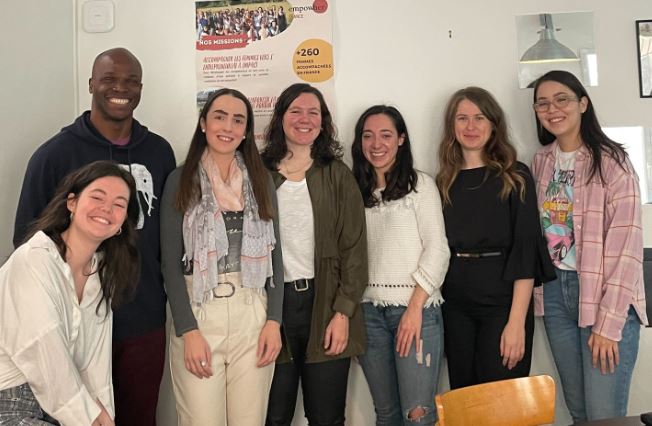
The fourth transnational project meeting of We4Change took place in Paris on October 25-26, 2022. The meeting focused on discussing feedback from pilot tests and addressing challenges encountered. Key agenda items included project management updates, communication and dissemination plans, planning of pilot events, curriculum updates, “Train the Trainer” program enhancements, and future multiplier events planning.
Participants shared insights and lessons learned from the pilot tests, which will shape the refinement of the We4Change program. The meeting emphasized effective coordination, communication strategies, and engaging stakeholders. Updates were made to the Communication and Dissemination Plan, pilot event planning, and the Changemakers Event Curriculum. The “Train the Trainer” program handbook was updated, and future multiplier events were discussed to expand the initiative’s impact.
The next and final transnational project meeting, scheduled for early 2023, will review progress and milestones achieved, as well as the steps for the closure of the project. .
7 September 2022
Newsletter September 2022
Achieving full gender equality is still centuries away, warns the United Nations
Disclaimer: This article contains excerpts from an article already published. We do not claim ownership or authorship of the material presented here. Please refer to the original source for the most up-to-date and reliable information, here: Press Release UN Women: Achieving full gender equality is still centuries away, warns the United Nations in a new report
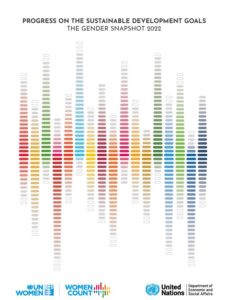
At the current rate of progress, it may take close to 300 years to achieve full gender equality, the “Progress on the Sustainable Development Goals (SDG): The Gender Snapshot 2022” shows. Global challenges, such as the COVID-19 pandemic and its aftermath, violent conflict, climate change, and the backlash against women’s sexual and reproductive health and rights are further exacerbating gender disparities.
- The new report highlights that, at the current pace of progress, SDG 5—achieving gender equality—will not be met by 2030.
- At the current rate of progress, the report estimates that it will take up to 286 years to close gaps in legal protection and remove discriminatory laws, 140 years for women to be represented equally in positions of power and leadership in the workplace, and at least 40 years to achieve equal representation in national parliaments. To eradicate child marriage by 2030, progress must be 17 times faster than progress of the last decade, with girls from the poorest rural households and in conflict-affected areas expected to suffer the most.
- The report also points to a worrisome reversal on the reduction of poverty, and rising prices are likely to exacerbate this trend. By the end of 2022, around 383 million women and girls will live in extreme poverty (on less than USD 1.90 a day) compared to 368 million men and boys. Many more will have insufficient income to meet basic needs such as food, clothing, and adequate shelter in most parts of the world. If current trends continue, in sub-Saharan Africa, more women and girls will live in extreme poverty by 2030 than today.
Source: United Nations/UN Women
The invasion of Ukraine and the ongoing war there is further worsening food insecurity and hunger, especially among women and children, limiting supplies of wheat, fertilizer and fuel, and propelling inflation. In 2021, about 38 per cent of female-headed households in war-affected areas experienced moderate or severe food insecurity, compared to 20 per cent of male-headed households.
Further facts and figures highlighted in the report include:
- In 2020, school and preschool closures required 672 billion hours of additional unpaid childcare globally. Assuming the gender divide in care work remained the same as before the pandemic, women would have shouldered 512 billion of those hours.
- Globally, women lost an estimated USD 800 billion in income in 2020 due to the pandemic, and despite a rebound, their participation in labour markets is projected to be lower in 2022 than it was pre-pandemic (50.8 per cent, compared to 51.8 per cent in 2019).
- There are now more women and girls who are forcibly displaced than ever before: some 44 million women and girls by the end of 2021.
- Today, over 1.2 billion women and girls of reproductive age (15–49) live in countries and areas with some restriction on access to safe abortion.
Other news:
- OP-ED UN Women: Expanding broadband safely and inclusively to reach digital gender equality
- Press Release UN Women: Calling on all men to act now to drive action on gender equality, world leaders gather to accelerate progress at UN Women’s HeForShe Summit
- Speech UN Women: Shaping a more inclusive digital transformation with SDG 5 at the core

24 August 2022
Newsletter August 2022
Climate Action Fast Facts: On Climate and Finance
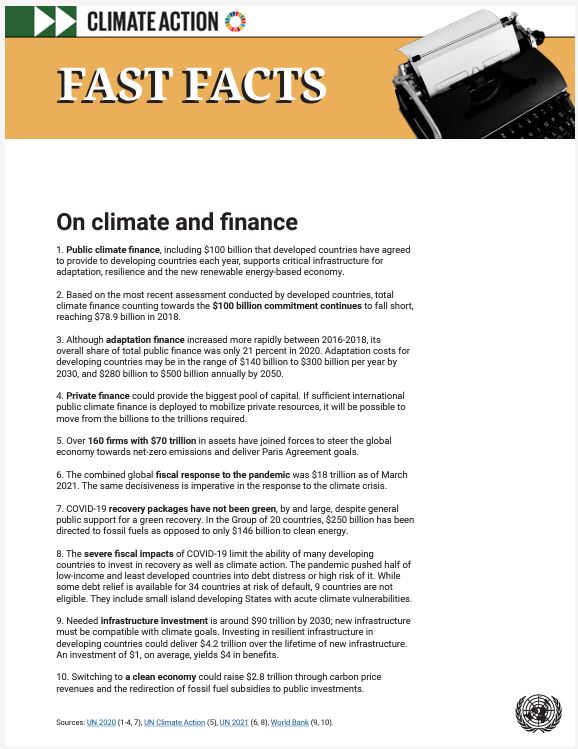
Source: United Nations / Climate Action, here.
29 July 2022
Newsletter July
In July we celebrate World Youth Skills Day
In 2014, the United Nations General Assembly declared 15 July as World Youth Skills Day, to celebrate the strategic importance of equipping young people with skills for employment, decent work and entrepreneurship. Since then, World Youth Skills Day events have provided a unique opportunity for dialogue between young people, technical and vocational education and training (TVET) institutions, firms, employers’ and workers’ organizations, policy makers and development partners. Participants have highlighted the ever-increasing significance of skills as the world is embarking on a transition towards a sustainable model of development.
We4Change supports female youth empowerment through digital action and civic change-making.
World Youth Skills Day 2022 takes place amid concerted efforts towards socio-economic recovery from the COVID-19 pandemic that are interconnected with challenges such as climate change, conflict, persisting poverty, rising inequality, rapid technological change, demographic transition, and others.
Other news:
29 June 2022
Newsletter June 2022
In June we celebrate World Environment Day

World Environment Day, held annually on 5 June, brings together millions of people from across the globe, engaging them in the effort to protect and restore the Earth. This year marks the event’s 50th anniversary.
THE COMMUNITY
World Environment Day is a global platform for inspiring positive change. People from more than 150 countries participate in this United Nations international day, which celebrates environmental action and the power of governments, businesses and individuals to create a more sustainable world. The event has been led by the United Nations Environment Programme (UNEP) since its inception in 1973.
HISTORY
World Environment Day puts a global spotlight on the pressing environmental challenges of our times. This UN international day has become the largest global platform for environmental outreach, with millions of people from across the world engaging to protect the planet.
2022 – Living in harmony sustainably with nature #OnlyOneEarth
World Environment Day paid homage to the 50th anniversary of what is considered the world’s first environmental summit, the 1972 United Nations Conference on the Human Environment. Like that gathering, it adopted the slogan “Only One Earth”, casting a spotlight on the pressing need to protect and restore humanity’s lone home.
At the 2022 official event, host country Sweden pledged to stop issuing licenses for new coal, oil and natural gas extraction. More than 65 million people celebrated World Environment Day online.
Source: What is World Environment Day?
28 May 2022
Newsletter May 2022
We4Change partners hold the third interim meeting
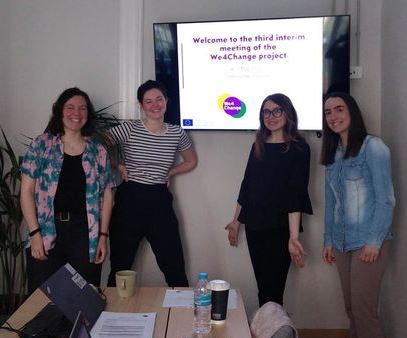 The third transnational meeting of the We4Change project took place on 4-5 May 2022 in Thessaloniki, Greece. The main topics discussed were:
The third transnational meeting of the We4Change project took place on 4-5 May 2022 in Thessaloniki, Greece. The main topics discussed were:
- Project management updates
- Communication & Dissemination updates: presentation of the updated Communication and Dissemination Plan; presentation of the communication and dissemination activities of partners in Y1; communication and dissemination activities for the next activities
- Follow-up from the LTTA activity “Transnational Train the trainer Workshop”: feedback from the partners on the content of the Workshop and feedback from the participants
- updates on the We4Change Changemakers Event Curriculum: discussion on evaluation and refinement methods
- updates on the We4Change “Train the Trainer” Programme: : discussion on evaluation and refinement methods
- Planning the Pilot tests
- Planning the multiplier events
Check out the training materials developed by the project so far here: http://we4change.eu/educational-resources/
28 April 2022
Newsletter April 2022
In April we celebrate International Girls in ICT Day
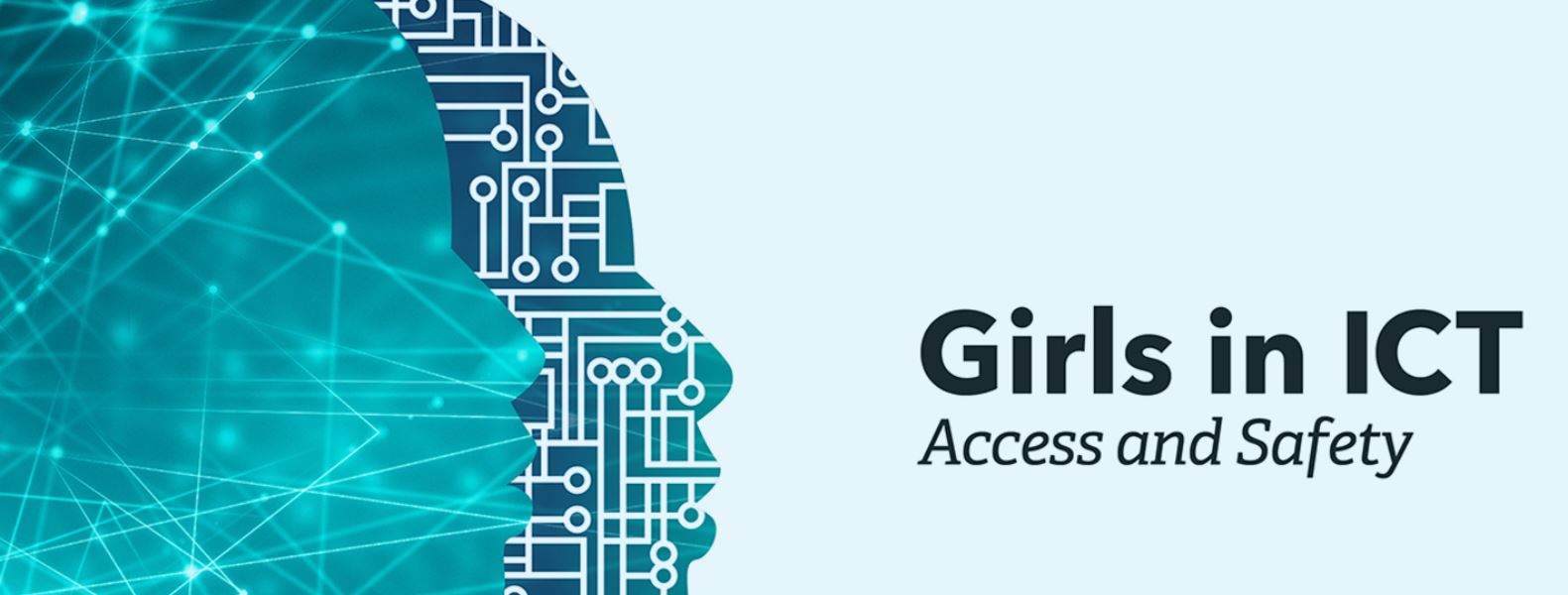
2022 Theme: Access and Safety
Access and Safety was selected as the 2022 thematic priority as part of the initial step for girls to be able to access the digital environment in a safe way. According to ITU’s latest data, the proportion of women using the Internet globally amounts to 48 per cent, compared to 55 per cent of men. In relative terms, this means that the global Internet use gender gap stands at 12.5 per cent. If women are unable to access the Internet and feel safe online, they are consequently unable to develop the necessary digital skills and engage in digital spaces. This in turn diminishes their opportunities to pursue careers in STEM related fields. The 2022 theme hence seeks to encourage discussions and events aimed at overcoming the access and safety barriers that girls face when they aspire to pursue STEM studies and careers.
TOOLKIT: Organizing a Girls in ICT event: Do you need more inspiring ideas to make your event a success? Check out the new toolkit that provides specific guidelines and creative ways to organize your event for Girls in ICT Day, 2022.
Source: itu.int/girlsinict
Other news:
22 April 2022
Earth Day 2022: Invest in our planet
Is the moment to change it all: the business climate, the political climate, and how to take action on climate. Now is the time for the unstoppable courage to preserve and protect the health of every citizen, family, and livelihood.

For Earth Day 2022, everyone needs to act (boldly), innovate (broadly), and implement (equitably). It’s going to take every single person out there. All in. Businesses, governments, and citizens — everyone accounted for, and everyone accountable. A project like We4Change is for the planet. It’s time to introduce an innovative and highly effective way of engaging more girls and young women in environmental action and civic participation.
29 March 2022
Newsletter March 2022
We4Change Train-the-Trainer Workshop
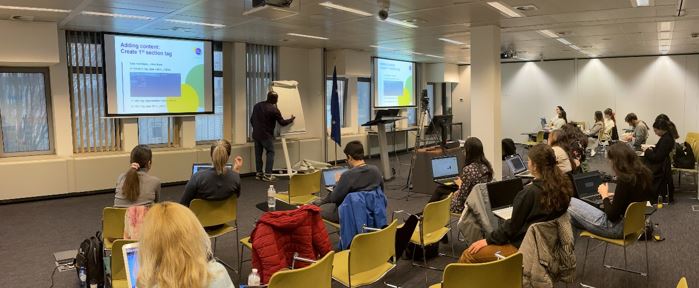
Source: We4Change/Digital Leadership Institute
Between 15-17 March 2022 project partners organized in Brussels (Belgium) the We4Change Train-the-Trainer workshop. The training was dedicated to youth workers and trainers interested to learn how to effectively deliver a We4Change Changemakers event – a hackathon-like event that offers an innovative combination of hands-on activities, training on digital, innovation and environmental awareness skills, problem-solving and co-creation skills to young girls and women to address climate change. During the three-day event, the participants learned a series of methods of facilitation of such type of event, which includes an important gender element, but also entrepreneurship and environmental activism. They learned communication skills to work with a diverse audience, to change and adapt to different situations and how to handle complex group dynamics to keep things running smoothly. In addition, they were trained to deliver or assist several workshops on themes such as: digital, design thinking and pitching.
If you would like to organize a We4Change Changemakers event you can find here the Handbook for Trainers and Youth Workers on Running a Successful We4Change Changemakers Event.
28 February 2022
Newsletter February 2022
International Day of Women and Girls in Science
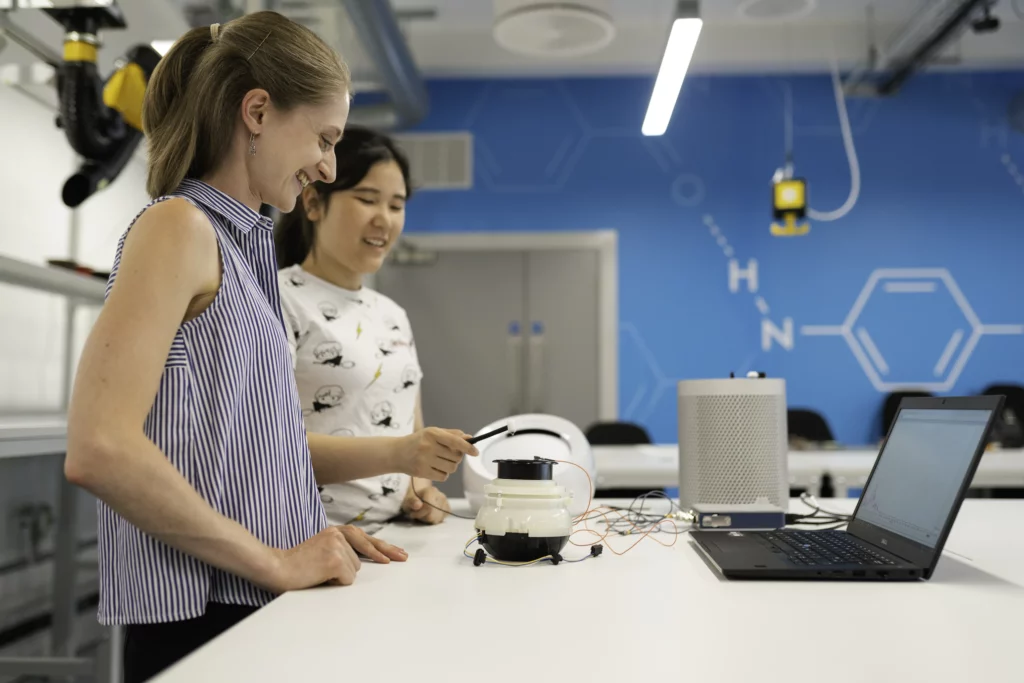
Disclaimer: The content of this article has been copied from another source. We do not claim ownership or authorship of the material presented here. Please refer to the original source for the most up-to-date and reliable information, here: In focus: International Day of Women and Girls in Science
Taking on the greatest challenges currently facing the global community will mean harnessing all talent. As the world continues to grapple with COVID-19 and the critically important climate crisis, the full and equal participation and leadership of women and girls in the science and technology communities is more important than ever. Now is the time to recognize women’s contributions in research and innovation, smash stereotypes and defeat discrimination against women and girls in science.
Globally, only 33 per cent of researchers are women, and they are awarded less research funding than men, and are less likely to be promoted. In the private sector too, women are less present in company leadership and in technical roles in tech industries. Women account for just 22 per cent of professionals working in artificial intelligence and 28 per cent of engineering graduates. These glaring underrepresentations limit our ability to find inclusive, sustainable solutions to modern problems and build a better society for all.
Last year, at the Generation Equality Forum, the Action Coalition on Technology and Innovation was launched, bringing together governments, private sector companies, the UN system and civil society in order to make concrete commitments to women and girls in STEM. By 2026, the Action Coalition aims to double the proportion of women working in technology and innovation, and ensure that women and girls participate fully in finding solutions to the largest and most complex problems of our lives.
Join the activities on the International Day of Women and Girls in Science, 11 February, calling for women’s full and equal access to and participation in science, and celebrate those that are leading action and innovation around the world.
Other news:
28 January 2022
Newsletter January 2022
Climate change measures must take account of gender equality or risk further impact on women's quality of life, local and regional leaders warn
Disclaimer: The content of this article has been copied from another source. We do not claim ownership or authorship of the material presented here. Please refer to the original source for the most up-to-date and reliable information, here: Climate change measures must take account of gender equality or risk further impact on women’s quality of life, local and regional leaders warn
The EU’s assembly of cities and regions calls on the Commission and co-legislators to commit to gender budgeting.
Climate change has a greater impact on the poorest of society, with women and girls being particularly vulnerable and at risk of being heavily impacted by global warming and environmental damage. EU climate policy will only succeed if it fully integrates gender equality in all its solutions, local and regional leaders have stressed.
Local and regional politicians in the European Committee of the Regions (CoR) have long denounced the lack of gender mainstreaming in the EU’s flagship policies. At its January plenary session, the CoR adopted a strongly worded opinion on Gender equality and Climate change: towards mainstreaming the gender perspective in the European Green Deal that calls for gender equality to be fully developed in EU climate polices and the European Green Deal. The move comes after a recent opinion calling for a similar approach to cohesion policy.
Kata Tüttő (HU/PES), rapporteur for the CoR opinion and deputy mayor of Budapest, declared: “The Green Deal is the new growth strategy of the EU, but we will not have a genuine growth without tackling gender inequalities. This is why the Green Deal is intrinsically intertwined with gender equality. There is a huge potential in cities and regions to close the gender gap, but we can only do it if we are just and listen to the needs of people. There must be a gender lens on the Green Deal and we need to show local decision makers that they are key actors to lead Europe in creating more liveable cities for everyone.”
The economic and social inequalities between men and women across the EU have a knock-on effect in a wide variety of areas, including many directly impacted by EU climate policies such as transport and energy. For example, the decarbonisation of our vehicles and buildings that the EU needs to make to meet its Green Deal ambitions must not further disadvantage women and girls because they are less likely to be able to afford newer, more expensive technologies.
The CoR opinion not only calls for gender mainstreaming in climate policy but also for the European Commission, the European Parliament and the EU Council to commit to a gender-based approach to budgeting as a whole, making a clear link to gender in all EU decisions on revenue and expenditure. This is still far from the case, with the most recent legislation such as the rules governing access to EU recovery and resilience funding to help support post-pandemic growth failing to include and reference gender mainstreaming.
Background information:
A decision on a Gender Policy and Implementation Plan to mainstream gender in the work of the Intergovernmental Panel on Climate Change (IPCC) at the global level was adopted at last year’s COP26-Glasgow.
We4Change partners launch the Call for Applications for the Train the Trainer Workshop
Edited 15.02.2022
We4Change consortium is looking for enthusiastic youth workers and trainers to support with the We4Change Changemakers events and launched the call for applications for the Train the Trainer workshop!
What is the Train the Trainer Workshop?
It is a training dedicated to youth workers and trainers that are interested to learn how to effectively deliver a We4Change Changemakers event – a hackathon-like event that offers an innovative combination of hands-on activities, training on digital, innovation
and environmental awareness skills, problem-solving and co-creation skills to young girls and women to address climate change.
The participants will learn a series of methods of facilitation of such type of event, which includes an important gender element, but also entrepreneurship and environmental activism. They will develop their communication skills to work with a diverse audience, to change and adapt to different situations and how to handle complex group dynamics to keep things running smoothly. In addition, they will be trained to deliver or assist several workshops on themes such as: digital, design thinking and pitching.
Below you’ll find the draft programme of the training:
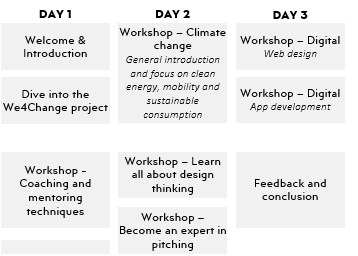
Upon completion of the training, participants will receive a YouthPass certificate documenting learning outcomes acquired in projects under the Erasmus+ programme of the European Union.
When will the Train the Trainer Workshop take place?
The training will take place in person between 15-17 March 2022, In Brussels (Belgium). Applicants must be available to participants to the entire 3 days training.
Travel and accommodation costs will be covered by the sending organization within the limits of:
- Participants from Belgium: 20 EUR travel grant and 530 EUR for individual support (accommodation and food);
- Participants from France: 180 EUR travel grant and 530 EUR for individual support (accommodation and food);
- Participants from Greece: 275 EUR travel grant and 530 EUR for individual support (accommodation and food);
- Participants from Moldova: 275 EUR travel grant and 530 EUR for individual support (accommodation and food);
- Participants from Portugal: 275 EUR travel grant and 530 EUR for individual support (accommodation and food);
Who can apply?
The training program is addressed to youth workers, trainers, coaches and mentors working or interested in working with girls and young women on the thematics covered by the We4Change project (youth empowerment, environmental action, digital skills, entrepreneurial mindset).
In order to be eligible, all applicants must:
- Be available for the entire duration of the training (15/03-17/03/2022)
- Be available to support as trainer during at least one of the We4Change Changemakers Events that will be organized by the sending organization in the period March – August 2022 (volunteer contract)
- Have a B2 English level (the training is organized in English)
- Have previous experience in working with youth in the areas covered by the We4Change project (climate change, digital skills, youth empowerment, entrepreneurship)
- Be a resident in one of the following countries: Belgium, France, Greece, Moldova or Portugal.
Application and selection procedure
All applications must be submitted via the application form available at: https://bit.ly/3FoveZA, before the set deadline of 10th of December at 23.59 CET. By submitting the application, applicants recognize to be aware and agree with the eligibility criteria and practical information shared for this call.
The applications will be evaluated in the period 13-16 of December under the following selection criteria:
- Motivation of the applicant on relation to the objectives of the training;
- Relevance of the applicant’s previous experience in the field of youth work;
- Availability to support as trainer during at least one of the We4Change Changemakers Events that will be organized by the sending organization.
Following the eligibility check and the evaluation process, the applicants will be announced about the results of selection on the 17th of December.
20 October 2021
We4Change partners organize the second interim meeting
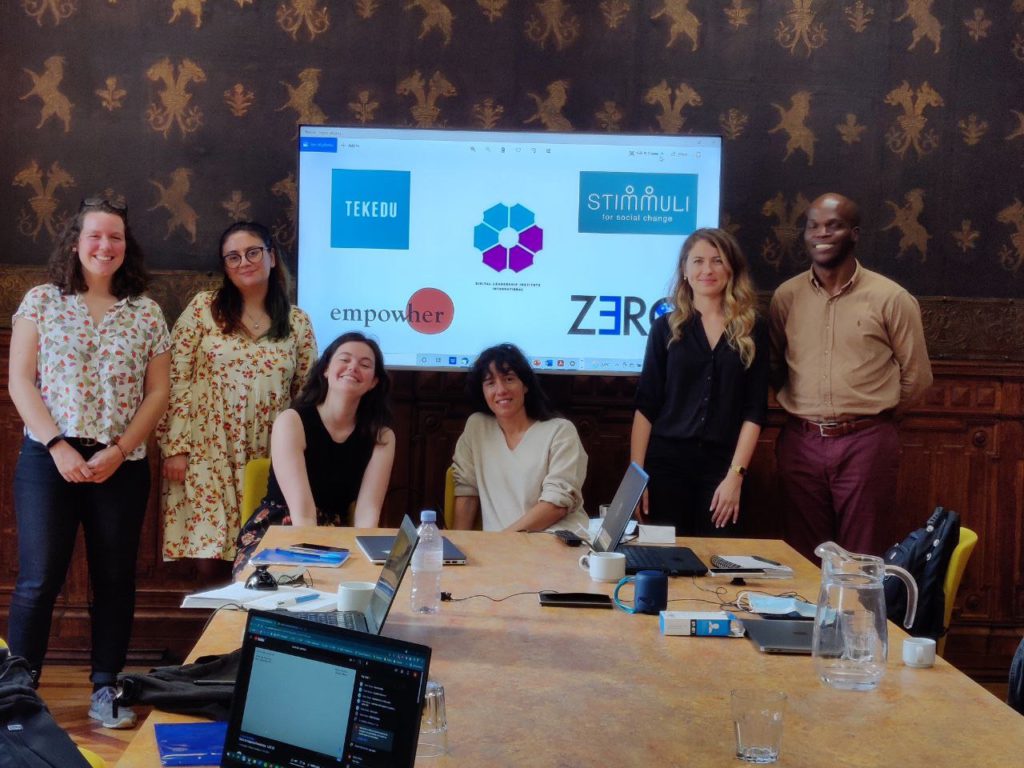
On 19 and 20 October, We4Change project partners met in Lisbon to discuss the updates of the We4Change project, but also to plan the period ahead. The main points on the agenda were the We4Change Changemakers Events Curriculum and the Train the Trainer programme, representing a series of educational resources dedicated to youth workers and organizations that want to organize and promote the We4Change Changemaking Events, raise awareness, engage stakeholders and contribute to creating an ecosystem that support girls and young women as innovators of the environmental transformation.
Next year project partners will organize across Europe a series of Changemaking Events that aim to dismantle stereotypes and boost self-confidence of girls and women as innovators, with the following elements at their core:
– Intergenerational: bringing together young and adult women together to collaborate on co-design tech solutions to address climate change in their local communities;
– Hands-on: using a “Learning by doing” approach for defusing any stereotypes, misgivings, or confidence issues; girls and women will experience a real-life innovation process by designing an app, developing a business plan, pitching an idea etc.;
– Social impact-oriented: Engaging with and learning through social action has a positive impact on young people’s attitudes and engagement at large; combining them with digital and innovation skills training formats, the purpose is to drive positive change.
– Community driven: creation of supportive communities of women to enforce confidence and self-esteem and promote gender balance in civic participation.
The events will take place in Belgium, France, Greece, Portugal and Moldova in 2022.
24 June 2021
News
Girls and Women as Changemakers for Environmental Awareness and Climate Action: A Context Specific Analysis
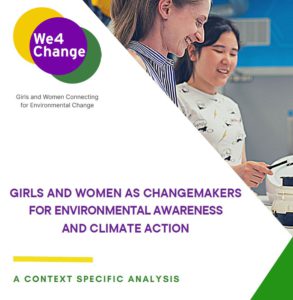 To set a solid foundation for the development of the We4Change curriculum, the context specific analysis aims to identify what motivates girls and young women across Europe to develop their creativity, knowledge and skills for the future and contribute to society, and how to best use ESTEAM (Arts and Entrepreneurship powered by STEM) to support this goal. Likewise, we will look at what are policy priorities and initiatives in five European countries, as well as other activities that share the same objectives.
To set a solid foundation for the development of the We4Change curriculum, the context specific analysis aims to identify what motivates girls and young women across Europe to develop their creativity, knowledge and skills for the future and contribute to society, and how to best use ESTEAM (Arts and Entrepreneurship powered by STEM) to support this goal. Likewise, we will look at what are policy priorities and initiatives in five European countries, as well as other activities that share the same objectives.
At European level, many initiatives are aimed at creating an inclusive, progressive and equal society, and some are specifically focused on supporting girls and women to fully participate to the society and fighting gender inequality. The following conclusions can be drawn from the analysis
- At European level there is there is a constitutional commitment to gender mainstreaming across all the EU’s policies and activities
- However, in the majority of the countries analysed, policies dedicated to youth have rather been designed to stimulate youth commitment in the civil society and social diversity, but without much consideration of the specific needs of girls and young women.
- The role of non-governmental organizations in supporting girls and young women to understand and be part of the ecological transition is essential, as they are able to adapt faster to the changes and needs of the society.
- Young people show an increasing interest in matters related to environmental awareness and sustainable development
- Girls and young women perceive a strong connection between ESTEAM and social impact.
- Increasing interest in ESTEAM studies among girls, particularly throughout their adolescent years, is critical so as to instill computational thinking and problem-solving skills, and eventually leading to them selecting a study/career path requiring those skills.
- Many girls and young women still perceive a lack of support and readily available information to pursue ESTEAM studies and careers.
- Girls and young women complement knowledge obtained at school with other sources of information (informal and non-formal education) to get a better understanding of ESTEAM subjects.
- To be more relatable for young people, ESTEAM subjects should be connected with examples from their daily reality and should include practical activities, so that they are better able to connect theories to real-world situations.
Read the full report here.
22 March 2021
We4Change Kick-off Meeting
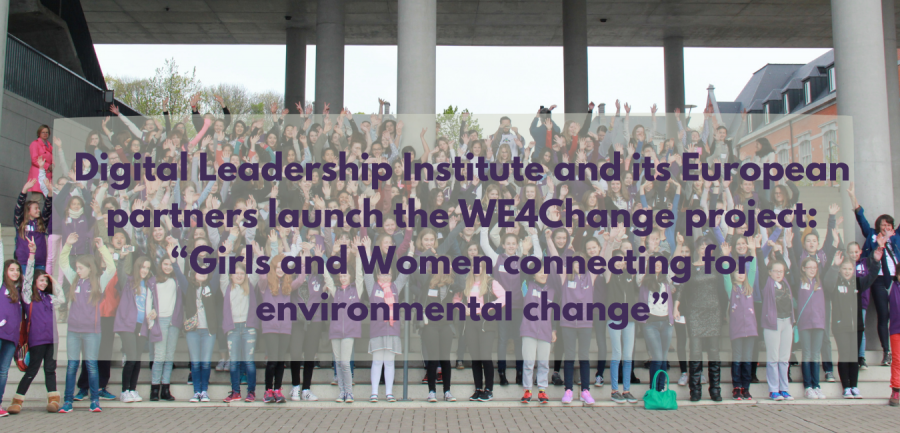
On 22 March 2021, the Digital Leadership Institute and four partner organizations from across Europe launched the WE4Change initiative supporting “girls and women connecting for environmental change.” WE4Change is an EU-funded project aiming to foster civic engagement of girls and young women from disadvantaged backgrounds by empowering them to understand their strengths, develop digital, leadership and changemaking skills, and increase their sense of initiative in the social and environmental sector.
For the next two years, Digital Leadership Institute (BE), Stimmuli for Social Change (GR), Empow’Her (FR), Tekedu (MD) and ZERO Associação Sistema Terrestre Sustentável (PT) will work together to offer an innovative combination of hands-on activities, training on digital, innovation and environmental awareness skills, problem-solving and co-creation of prototypes to address climate change, responding directly to the needs of young women to break down stereotypes, develop their creativity and confidence, and contribute to society.
The first project meeting took place on the 23rd of March 2021, with project partners discussing the first project phase aiming at setting a solid and appropriate foundation for the development of the We4Change project. The first steps include a context specific gender analysis that will be conducted in each participating country looking at i) youth policy & youth participation programmes, ii) environment & climate, iii) digitalization and innovation related to the issues tackled by the project to ensure the appropriate development of the trainings and materials to be developed throughout the project.

